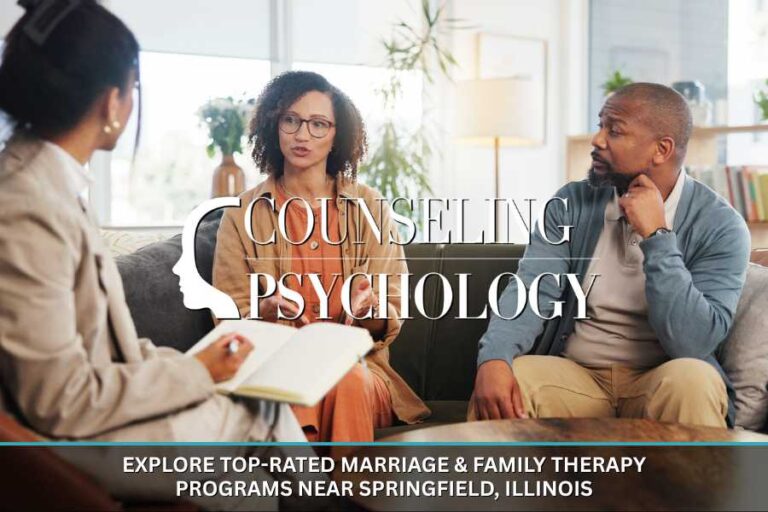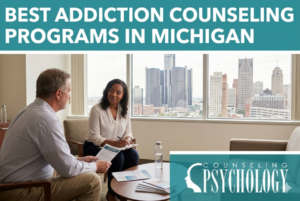Browse Top Rated Marriage & Family Therapy Programs Near Springfield, Illinois

Marriage and family therapy (MFT) plays an essential role in addressing the mental health needs of individuals, couples, and families across Illinois. In Springfield, the state capital, the demand for skilled marriage and family therapists continues to rise as communities seek support for challenges such as relationship strain, intergenerational conflict, and the impact of economic pressures. Local health agencies have noted a consistent increase in requests for family counseling services, underscoring the urgency of training new professionals. According to the U.S. Bureau of Labor Statistics, employment of marriage and family therapists is projected to grow 15 percent from 2022 to 2032, much faster than the average for all occupations, reflecting both national and statewide demand.
Affordable and top rated programs in the area help prepare emerging therapists to meet these growing demands while equipping them with licensure ready skills and meaningful clinical experiences. Students enrolled in these programs gain exposure to diverse case examples and community contexts, ensuring they are not only academically prepared but also ready to apply evidence based practices that address the unique needs of central Illinois families. By combining affordability with strong clinical preparation, these programs make the counseling profession more accessible while supporting long term workforce development in Springfield.
2026 Explore Top Rated Marriage & Family Therapy Programs Near Springfield, IL
University of Illinois Springfield
Springfield, IL - Public 4-Year - uis.edu
Master's - M.A. in Marriage, Couples, and Family Counseling
Campus Based - Visit Website
University of Illinois Springfield's M.A. in Marriage, Couples, and Family Counseling offers a comprehensive 61-credit graduate program meticulously designed for aspiring counseling professionals. Emphasizing a systemic approach, the program integrates core counseling curriculum with specialized coursework in family dynamics and clinical interventions. Students complete a minimum of 120 clinical service hours through community agency placements, gaining practical experience across diverse populations. The concentration focuses on advanced relational counseling techniques, professional development, and multicultural counseling perspectives. Applicants should prepare for a rigorous academic journey that prepares them for professional licensure and complex therapeutic practice in marriage and family counseling settings.
- 61 total required credit hours
- 4 specialized concentration courses
- Minimum 120 clinical service hours
- Community agency clinical placements
- Comprehensive core counseling curriculum
- Practicum and internship experiences
- Systemic counseling approach
- Multiple counseling theory courses
- Multicultural counseling emphasis
- Professional experience focus
Local Context: Why Springfield Needs Marriage & Family Therapists
Springfield's unique role as a government and healthcare hub shapes the region's mental health needs. Public employees, healthcare workers, and residents from surrounding rural areas often turn to Springfield for counseling services. Reports from the Illinois Department of Public Health show that central Illinois has higher than average rates of family related stressors, including financial strain and substance use challenges. Marriage and family therapists are well positioned to provide support through systemic approaches that consider the family unit as a whole.
Growing demand has also been fueled by greater awareness of mental health across Illinois. Families are increasingly seeking counseling support as a proactive step rather than waiting until issues escalate, creating opportunities for early intervention. For students in Springfield's MFT programs, this trend translates to valuable field placements that mirror the realities of local community needs.
Pathways to Licensure in Illinois
Becoming a licensed marriage and family therapist in Illinois requires advanced education and supervised clinical training. While program structures vary, common components include:
- Graduate level coursework in family systems theory, assessment, and treatment.
- Specialized training in multicultural counseling and ethics.
- Supervised practicum and internship experiences with direct client contact.
- Post graduate clinical supervision hours as required by the Illinois Department of Financial and Professional Regulation.
These requirements ensure that graduates not only gain theoretical knowledge but also practical skills that prepare them for licensure and independent practice. For example, a practicum placement in Springfield may involve working with couples navigating parenting stressors, while internships in surrounding counties could focus on intergenerational households facing economic transitions.
Affordability and Program Flexibility
Many students in Springfield balance graduate education with work and family responsibilities. Budget conscious options allow them to pursue advanced training without overwhelming financial strain. Programs may offer flexible formats such as hybrid learning, part time study, and evening classes, making them accessible to a wider range of students.
Factors That Influence Program Affordability
| Factor | Impact |
| In State Tuition | Reduced tuition rates for Illinois residents |
| Scholarships and Grants | Financial support to offset educational costs |
| Part Time Enrollment | Ability to continue working while studying |
| Hybrid or Online Options | Lower commuting costs and flexible scheduling |
Students should also evaluate the return on investment by considering program completion rates, licensure exam pass rates, and graduate employment outcomes. Choosing an affordable therapy or counseling program in Illinois with strong career outcomes provides long term financial stability.
Training That Reflects Community Needs
MFT programs in Springfield often integrate local and regional concerns into coursework and practicum experiences. Students may train in settings such as community health centers, nonprofit organizations, and hospital based clinics. Common practice areas include:
- Supporting families coping with substance use disorders.
- Addressing stress related to unemployment or economic transitions.
- Helping couples navigate relationship challenges and parenting stressors.
- Providing counseling for intergenerational households in rural and urban contexts.
Real world training in these areas ensures graduates are prepared to meet the needs of families in Springfield and surrounding regions. For instance, a student interning in a nonprofit agency may learn to design prevention workshops for adolescents, while another in a hospital setting may focus on crisis intervention for families in acute distress.
Career Prospects for Marriage & Family Therapists in Illinois
The career outlook for marriage and family therapists is strong in Illinois, with statewide demand projected to grow faster than the average for other professions. In Springfield, opportunities extend across multiple practice settings, including:
- Private practice serving couples and families.
- Community based nonprofit organizations.
- Hospital and healthcare systems.
- School based and youth focused programs.
Salary potential varies depending on experience and setting, but MFT roles generally offer competitive compensation and opportunities for advancement. Professionals often begin their careers in community agencies or healthcare systems before moving into private practice, where they can shape their own schedules and service offerings. This career pathway balances financial stability with professional independence.
Choosing the Right MFT Program in Springfield
When selecting a program, prospective students should consider more than cost. Key elements of strong programs include:
- Accreditation aligned with Illinois licensure requirements.
- Experienced faculty with expertise in family systems and clinical practice.
- Robust practicum and internship placement networks in Springfield and surrounding counties.
- Student support services, including advising, exam preparation, and career guidance.
Evaluating these factors helps ensure that students are not only prepared for licensure but also positioned for long term career success. Prospective students can also benefit from reviewing alumni outcomes and program completion statistics, which provide insight into overall program effectiveness.
Building a Future as a Marriage & Family Therapist in Springfield
Pursuing a top rated MFT program in Illinois is both a personal and professional investment. Affordable, high quality training equips students with the knowledge and supervised practice hours required for licensure while responding to the needs of central Illinois families. Graduates contribute to strengthening the region's mental health infrastructure and help create healthier, more resilient communities.
With a focus on affordability, flexibility, and community relevance, Springfield's MFT programs provide a strong foundation for those dedicated to supporting individuals, couples, and families through evidence based therapeutic care. By choosing a program that aligns with licensure requirements and local workforce needs, students take a critical step toward building rewarding careers that make a lasting impact in Springfield and beyond.
Sources
- U.S. Bureau of Labor Statistics
- Illinois Department of Public Health
- Illinois Department of Financial and Professional Regulation
- Substance Abuse and Mental Health Services Administration
- American Association for Marriage and Family Therapy



